
The newsletter of UCL Library Services - Issue 27: Spring term, 2011
Inside this issue
|
|
* Top Tip! *
 In the run up to exams and essay deadlines please remember that Library staff can assist you in all sorts of ways so see our "Getting Help" pages for more information.
In the run up to exams and essay deadlines please remember that Library staff can assist you in all sorts of ways so see our "Getting Help" pages for more information.
Debs Furness, Head of Enquiry Services
|
|
Editorial board members:
Vincent Matthews, Chris Carrington, Deborah Furness, Nova Larch, Grazia Manzotti, Martine Painter, Ruth Russell & Margaret Stone.
:: Contact the editorial board
|
24 hour pre-exam opening
UCL Main & Science Libraries wil be open 24 hours over the 2011 exam period which will run from Wednesday 27 April to Friday 10 June 2011 inclusive.
For further details please see http://www.ucl.ac.uk/library/news.shtml#24hour.
by Vincent Matthews, Group Manager for Reader Services
Special Collections on the move
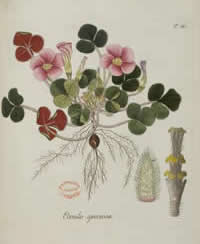 Most of you will now be aware of the upcoming relocation of Special Collections from Hampstead Road this Summer, due to the expiry of the lease on the premises. This will be the second time in 10 years that the department has faced upheaval and we are preparing for the journey ahead. At least we can draw on previous experience in this complex and challenging project! There is a team of professional relocation contractors already on site, barcoding every box and volume that is due to be moved, working alongside the site staff and a whole army of volunteers, wrapping, boxing, listing and labelling every collection in our 7000 metres-worth of storage. We are looking forward to re-opening to researchers again at The National Archives in Kew in September, where most of the collections will be stored until 2013, and during which time the UCL staff will be joining colleagues on the Bloomsbury campus once more. Access to the collections is only by prior appointment with The National Archives via UCL Special Collections staff.
Most of you will now be aware of the upcoming relocation of Special Collections from Hampstead Road this Summer, due to the expiry of the lease on the premises. This will be the second time in 10 years that the department has faced upheaval and we are preparing for the journey ahead. At least we can draw on previous experience in this complex and challenging project! There is a team of professional relocation contractors already on site, barcoding every box and volume that is due to be moved, working alongside the site staff and a whole army of volunteers, wrapping, boxing, listing and labelling every collection in our 7000 metres-worth of storage. We are looking forward to re-opening to researchers again at The National Archives in Kew in September, where most of the collections will be stored until 2013, and during which time the UCL staff will be joining colleagues on the Bloomsbury campus once more. Access to the collections is only by prior appointment with The National Archives via UCL Special Collections staff.
by Gillian Furlong, Head of UCL Special Collections
Medical History funding
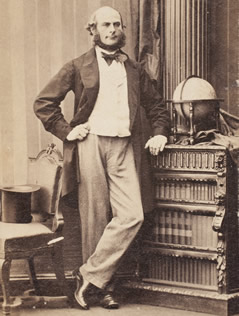 Alongside the exhibitions and other events to mark the centenary of Francis Galton’s death in 1911, and thanks to the generosity of the Wellcome Trust, UCL Library Services is due to begin a major programme to enhance access to his archive and those of other seminal figures in the development of modern genetics held at UCL Special Collections.
Alongside the exhibitions and other events to mark the centenary of Francis Galton’s death in 1911, and thanks to the generosity of the Wellcome Trust, UCL Library Services is due to begin a major programme to enhance access to his archive and those of other seminal figures in the development of modern genetics held at UCL Special Collections.
Sir Francis Galton (1822-1911), cousin of Charles Darwin, was a polymath, founder of eugenics, pioneer of many of the statistical methods of analysis still used today, and responsible for the establishment at UCL of both the Galton Eugenics Laboratory and the Galton Chair of Eugenics. Highly controversial to modern eyes, he nevertheless remains of outstanding significance in the history of genetics. His many innovations ranged from the use of twins in genetic research to the development of the first workable fingerprint classification system.
The Galton Collection forms the basis of the material relating to the history of genetics held at UCL. It comprises his papers and personal paraphernalia as well as his fingerprints collection which is complemented by the fingerprints held in UCL Museums & Collections. Other significant collections in genetics and related areas held by UCL include that of statistician and eugenicist Karl Pearson (the first holder of the Galton Chair of Eugenics and also a contradictory figure – a prominent free-thinker and socialist who advocated war against “inferior races”), alongside those of geneticist John Burdon Sanderson Haldane, psychiatrist and medical geneticist Lionel Sharples Penrose, statistician Egon Sharpe Pearson (son of Karl), statistician and geneticist Cedric Austen Bardell Smith, embryologist Sir Gavin De Beer and statistician and author of works on heredity Arthur Dukinfield Darbishire.
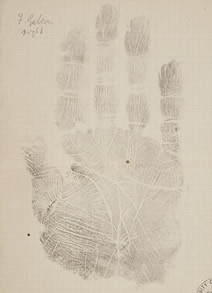 There is already considerable interest from researchers across the disciplines in these collections, which have accounted for around 25% of the usage of Special Collections archive materials in recent years. This usage is all the more remarkable given the lack of readily accessible, comprehensive information about them. It is a mark of the importance of this material that the Wellcome Trust has allocated £150k from its Research Resources in Medical History grants scheme, 50% more than its normal upper limit for a single project.
There is already considerable interest from researchers across the disciplines in these collections, which have accounted for around 25% of the usage of Special Collections archive materials in recent years. This usage is all the more remarkable given the lack of readily accessible, comprehensive information about them. It is a mark of the importance of this material that the Wellcome Trust has allocated £150k from its Research Resources in Medical History grants scheme, 50% more than its normal upper limit for a single project.
This will fund a 30-month programme to assess and undertake essential conservation / preservation on over 32,000 items and to create around 24,000 catalogue records. We are also hoping to collaborate further with the Wellcome in order to digitise at least some of the material as part of the Wellcome Digital Library programme, under the theme of Modern Genetics and its Foundations.
by Diana Mercer, Group Manager for Bibliographic Services
An Enquiring Mind: Francis Galton 1822-1911
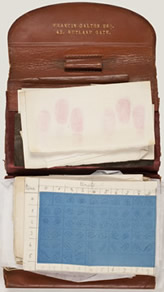
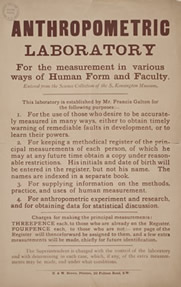 UCL Library Services’ new exhibition draws on the aforementioned Galton Archive held in our Special Collections and is one of a Galton Centenary programme of events taking place at UCL during 2011.
UCL Library Services’ new exhibition draws on the aforementioned Galton Archive held in our Special Collections and is one of a Galton Centenary programme of events taking place at UCL during 2011.
Providing a window onto his private life as well as a sample of his many and diverse interests and investigations, items on display range from family mementos and evidence of Galton as a child prodigy, to the records of his research, and fascination with measurement - human faculty and pedigree animals were amongst his subjects. It is also a rare opportunity to see the bowdlerised manuscript of his unpublished utopian novel The Eugenic College of Kantsaywhere, and two items from the UCL Galton Collection, a death mask and photograph of Galton after death.
The exhibition will be formally opened by Sir Mark Walport, Director of the Wellcome Trust, and will remain on display until December 2011.
Exhibition location: UCL Main Library, Wilkins Building.
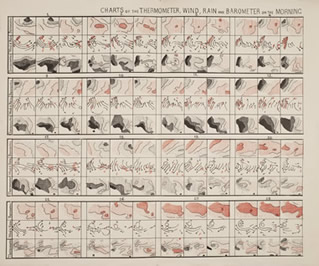
by The Library Services Exhibitions Group
Visit of the Chinese Ambassador to UCL Library Services
On 28 January 2011, UCL Library Services was honoured by a visit from the Chinese Ambassador in London, His Excellency Liu Xiaoming, at the invitation of the Provost and President of UCL. The Ambassador first gave a lecture to a packed Gustave Tuck, entitled Building a Harmonious China-West Relationship, after which he took questions from the audience. At the end of the lecture, I met the Ambassador and his wife, along with his entourage, and Professor Xiao Guo, UCL’s Pro-Provost for China (all pictured below in the Flaxman Gallery).
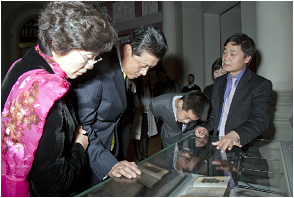 The party then walked through the History section of the Library and down to the Flaxman Gallery, accompanied by the Provost and a larger party. I introduced the Ambassador and his wife to the six Chinese exhibits from UCL Special Collections which were on display in the Library’s new exhibition cases. The Ambassador is pictured above being shown Samuel Kidd’s China (London: Printed for Taylor & Walton, 1841), with a colour plate of the then Emperor of China in dragon robes. Samuel Kidd was UCL’s first Professor of Chinese, being appointed for a period of 5 years from 1837.
The party then walked through the History section of the Library and down to the Flaxman Gallery, accompanied by the Provost and a larger party. I introduced the Ambassador and his wife to the six Chinese exhibits from UCL Special Collections which were on display in the Library’s new exhibition cases. The Ambassador is pictured above being shown Samuel Kidd’s China (London: Printed for Taylor & Walton, 1841), with a colour plate of the then Emperor of China in dragon robes. Samuel Kidd was UCL’s first Professor of Chinese, being appointed for a period of 5 years from 1837.
The Ambassador and his wife asked several questions about the items on view and particularly enjoyed seeing UCL’s treasures in the context of the glorious Flaxman Gallery. I gave the Ambassador a copy of UCL Library Services’ exhibition catalogue Charting China, which is available online in our Digital Collections. He gave me two gifts in return - a set of two masks which are models of masks used in Chinese opera in Beijing and a western-style tie which goes with my new suit.
by Paul Ayris, Director of UCL Library Services
Spotlight on… the UCL Institute of Archaeology Library
The Institute of Archaeology Library can be found at 31-34 Gordon Square, on the fifth floor of the Institute of Archaeology. The library has wonderful views over Gordon Square, especially in the Spring.
The Institute Library has an international reputation as one of the finest archaeological collections in the world. It supports the taught programmes offered by the Institute and provides research material on a wide variety of topics covering all aspects of archaeology, museum studies and cultural heritage. The library also contains the Yates Classical Archaeology Library and the prestigious Edwards Egyptology Library.
Our collections and facilities can be explored using our new interactive map.
Our holdings include approximately 70,000 books, 10,000 pamphlets and nearly 700 current journals. They are strong on all aspects of archaeological theory, prehistoric Britain and Europe, the archaeology of Western Asia (Ancient Near East), Classical Greece and Rome, Egypt, Sub-Saharan Africa, and Latin America. Environmental archaeology, forensic anthropology, ancient technology and the conservation of artefacts and museum and heritage studies are also very well represented, as are specialist materials relating to the archaeology of London.
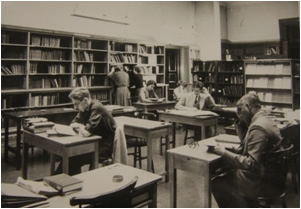 The first Institute of Archaeology Library in St. John's Lodge
The first Institute of Archaeology Library in St. John's Lodge
The Institute Library enjoys a close and supportive relationship with the Institute of Archaeology, which reflects its shared history. Although now part of UCL Library Services, the Institute Library began life as an integral element of the new and innovative Institute of Archaeology founded by Sir Mortimer (R.E.M.) Wheeler in 1937 at St John's Lodge, the Inner Circle, Regents Park. In 1958, when the Institute moved to its current premises in Gordon Square, the collections moved into a purpose-built archaeology Library on the first floor. Under the leadership of its first librarian, archaeologist Joan du Plat Taylor (who also found time to start the discipline of underwater archaeology when not working in the library), the library swiftly developed strong European and Near Eastern archaeology collections. By the 1970s, collections included extensive human environmental and conservation collections, as well as material relating to all aspects of global archaeology.
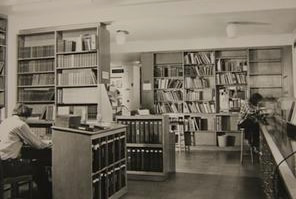 The 1st floor Institute of Archaeology Library
The 1st floor Institute of Archaeology Library
The Library’s unique classification system developed by Joan is still in use today, and the tradition of on-site subject expertise that she developed is still maintained with subject specialists providing expert advice and answering enquiries.
Similar strong, affectionate links are shared with the Petrie Museum of Egyptology; the Edwards Egyptology Library was originally founded to support the Amelia Edwards Chair in Egyptology, first held by the dynamic and influential Egyptologist, Sir W. M. Flinders Petrie.
Today, the Library on the fifth floor is a blend of new technologies and old traditions. New material, in both paper and electronic formats, is constantly being purchased for the Institute Library. A comprehensive range of videos, DVDs, CD-ROMS, online databases and electronic resources, including e-journals, is also available and on-line reading lists facilitate access to key readings in digital format for a growing number of courses. Archives material (papers and photos) relating to the history of archaeology and of the Institute itself, are highly valued by researchers and are available for consultation through UCL Special Collections. These include the papers of Sir Mortimer Wheeler, Professor Gordon Childe, Sir W. M. Flinders Petrie, Professor Frederick Everard Zeuner and Gertrude Caton-Thompson.
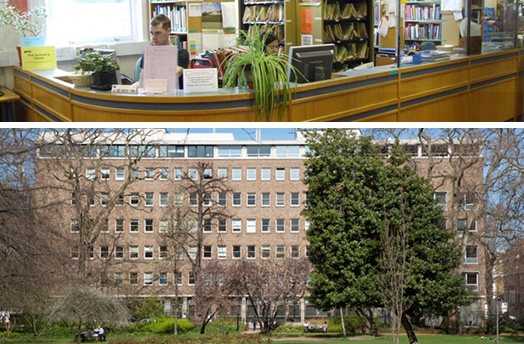 Today's 5th floor Institute of Archaeology Library
Today's 5th floor Institute of Archaeology Library
Next year, 2012, the Institute of Archaeology celebrates its 75th anniversary. The Institute Library looks forward to celebrating its "birthday" along with the Institute, as well as embarking on a new venture in developing a branch in Qatar.
by Katie Meheux, Issue Desk Head for Institute of Archaeology Library
Profile: Vanessa Freedman, Hebrew & Jewish Studies Librarian
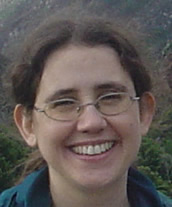 Librarianship is my second career, having previously worked in charity fundraising after studying Classics at Cambridge. I came to UCL in 2007, studying part-time for an MA in Library and Information Studies in addition to my post as Subject Librarian. Before that I was Assistant Librarian at Leo Baeck College, a small seminary for training rabbis and Jewish educators. It took some time to get used to working in such a large and diverse institution as UCL!
Librarianship is my second career, having previously worked in charity fundraising after studying Classics at Cambridge. I came to UCL in 2007, studying part-time for an MA in Library and Information Studies in addition to my post as Subject Librarian. Before that I was Assistant Librarian at Leo Baeck College, a small seminary for training rabbis and Jewish educators. It took some time to get used to working in such a large and diverse institution as UCL!
I work in the Main Library three days a week, where I am responsible for the Hebrew and Jewish Studies collection, as well as the adjacent Humanities Periodicals, and the Dutch collection (the latter because I have studied Dutch as I have family in the Netherlands). My role involves collection management – that is, selecting items to order, assigning a classmark when they arrive and deciding on what to send to Store when we run out of space in the Main Library. I also catalogue the Hebrew and Yiddish books because these require specialist language skills.
Subject librarians also liaise with the relevant departments and faculties, and I have close working relationships with academics in the Hebrew and Jewish Studies and Dutch departments. I provide library inductions and information skills training to students and staff, and answer enquiries, which can range from helping a reader to find a book that isn't on the shelf to in-depth support with using a particular database. I also sit on the general Enquiry Desk once a week.
I spend the other two days of the week at Special Collections, working with the extensive Jewish collections. My current project involves the papers of Moses Gaster. I have been organising and listing these and we have now received funding to digitise some of his huge collection of 'ephemera' – visiting cards, invitations, menus, programmes, greetings cards etc – which provides a fascinating insight into the Anglo-Jewish community in the late nineteenth and early twentieth century.
Last year I took a 4-month 'career break' to travel to South Africa and California with my family, visiting Jewish communities and libraries there. It was a great opportunity for professional and personal development, but (apart from the weather) I'm delighted to be back as I greatly enjoy my varied role at UCL.
by Vanessa Freedman, Hebrew & Jewish Studies Librarian
A little bird tells us that Vanessa achieved a Distinction in her Librarianship MA at UCL's Department of Information Studies and is the 2009-10 holder of the Sir John MacAlister Medal. Evidently she is too modest to say this publicly, but we all send her our warmest congratulations.
A very rare find in UCL Special Collections
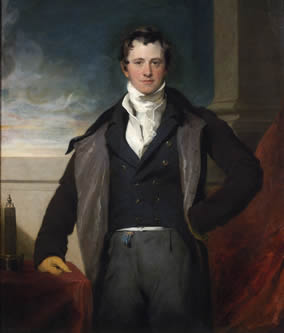 © The Royal Society. Permission must be sought from the Royal Society library for any further reproductions of the image prior to publishing.
© The Royal Society. Permission must be sought from the Royal Society library for any further reproductions of the image prior to publishing.
In April 1890 Professor George Carey Foster presented UCL Library with a work in which he had written a note on the flyleaf: “This volume is rare; it was the first work of Davy, and few copies were printed, and he was exceedingly averse to it being granted a foreword…”. Humphry Davy was 19 years old at the time of publication in 1799, and living in what Thomas Beddoes called “the remotest town in Cornwall” [Penzance]. However, he later became famous as the inventor of the Davy Lamp, which is credited with saving the lives of thousands of miners, for his pyrotechnic lectures at the Royal Institution, and as President of the Royal Society. He became a baronet in 1819 and he seems to have become a little ashamed of his earlier literary efforts as he grew older. Only three other extant copies of his Essays on heat, light, and the combinations of light (system number: 1474627) are recorded by the British Library's English Short Title Catalogue, and they are all in the United States. The UCL copy is far from pristine but the text is clear and clean and it appears to be the only one available for public scrutiny in the United Kingdom.
The book can be found in our Catalogue by typing davy heat light into the “Quick Search” box, and is located at HISTORY OF SCIENCE SOURCES C DAV which can be consulted in our Special Collections.
To find out more about Sir Humphry Davy, see:
- Oxford Dictionary of National Biography, which UCL staff and students can access through our Databases.
by Bill Lehm, UCL Special Collections
 Top of page Top of page
Issue 27 - Spring term, 2011
|

